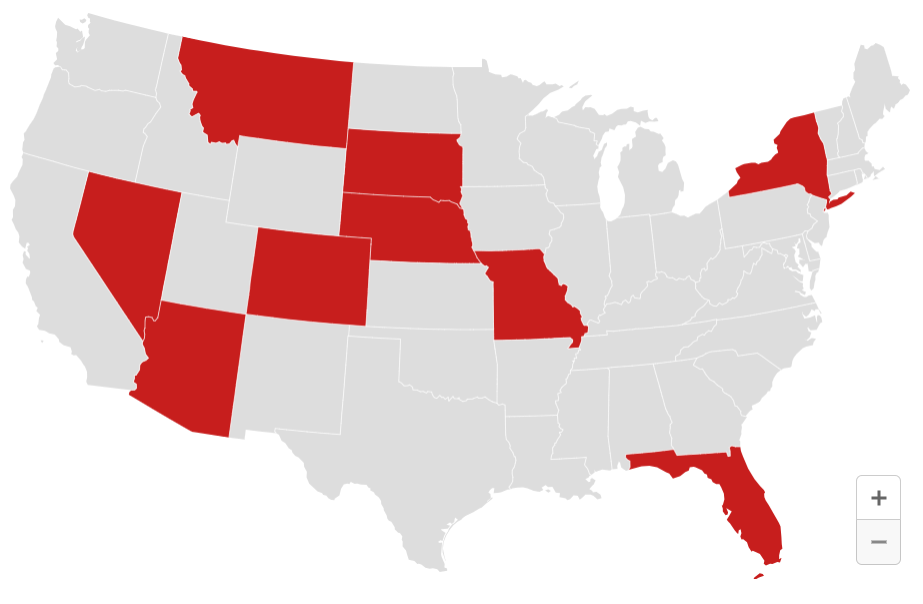WASHINGTON – Abortion will be on the ballot in 10 U.S. states this Tuesday as voters turn out for the first presidential election since the Supreme Court overturned Roe v. Wade in 2022.
Almost all of the ballot measures aim to enshrine the right to abortion, including the referendum in South Dakota, where reproductive rights advocates seek to end the state’s total abortion ban.
Abortion access has been a focal point of the 2024 presidential election and will play a key role in mobilizing voters. David Cohen, Professor of Law at Drexel University’s Thomas R. Klein School of Law and one of the leading national experts on abortion, said that this election year is hugely important in the history of abortion access in the U.S.
“It’s irrelevant what happens on these state ballot initiatives if Donald Trump wins,” Drexel said. “Even if a state protects abortion, if the federal government bans it, or makes it extremely difficult, that trumps state law, even if a state has passed a constitutional amendment protecting it.”
The citizen-initiated ballot measures required months of canvassing by abortion advocacy groups in order to reach the signature threshold, and both pro-life and pro-choice organizations have been busy encouraging voters to head to the polls.
Chris Melody Fields Figuerdo, executive director of Ballot Initiative Strategy Center, a liberal advocacy organization, feels confident that voters will opt to protect reproductive rights regardless of political affiliation.
“Republicans, Democrats and Independents in states like Kansas and Kentucky, where the electorate may seem more conservative, voted against those abortion bans,” Figuerdo said. “We do know that the issue of abortion and reproductive rights is a highly motivating issue for voters.”
Since 2022, seven states thus far have had abortion on the ballot, with all seven choosing to vote in favor of abortion rights.
Arizona
Arizona’s Right to Abortion Initiative would establish the right to abortion until the point of fetal viability, usually considered around 24 weeks.
Colorado
The Right to Abortion Initiative in Colorado would enshrine the right to abortion in the state’s constitution and allow public funds to be used for abortion.
Florida
Florida Amendment 4 seeks to expand abortion rights in the state by allowing for the procedure until fetal viability or when deemed necessary to protect the health of the patient.
Maryland
Maryland’s Right to Reproductive Freedom Amendment would enshrine the right to an abortion in the state constitution, establishing a right to “reproductive freedom,” including decisions to prevent, continue or end one’s own pregnancy.”
Missouri
The Right to Reproductive Freedom Amendment in Missouri would establish the right to reproductive freedom in the Missouri Constitution and only allow the state’s legislature to pass laws regulating abortion after the point of fetal viability.
Montana
Montana’s CI-128, Right to Abortion Initiative, seeks to amend the state constitution to allow for the right to an abortion, a right which is already held in the state.
Nebraska
Nebraska has two ballot measures. The Prohibit Abortions After the First Trimester Amendment would prohibit abortion in the second and third trimesters. The Right to Abortion Initiative would allow citizens to obtain an abortion until fetal viability, an expansion of rights from the currently-enforced 12-week
New York
The Equal Protection of Law Amendment would add language to the New York Bill of Rights that people cannot be denied rights based on "sexual orientation, gender identity, gender expression, pregnancy, pregnancy outcomes, and reproductive healthcare and autonomy."
Nevada
Nevada’s Right to Abortion Initiative seeks to allow for the right to an abortion until fetal viability in the state’s constitution.
South Dakota
South Dakota’s Constitutional Amendment G would provide a trimester framework for regulating abortion in the State Constitution, which would include the right to an abortion for all citizens during the first trimester of pregnancy.

